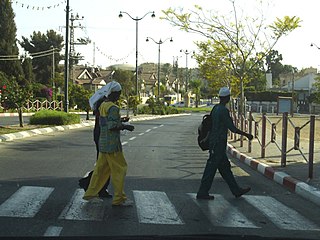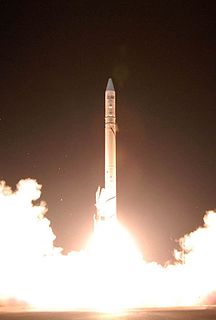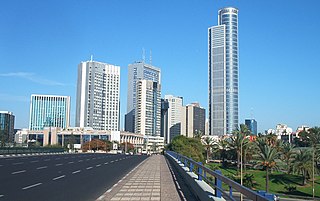
The Middle East is a region spanning the vast majority of Western Asia and all of Egypt. The term has come into wider usage as a replacement of the term Near East beginning in the early 20th century. The broader concept of the "Greater Middle East" also includes the Maghreb, Sudan, Djibouti, Somalia, the Comoros, Afghanistan, Pakistan, and sometimes Transcaucasia and Central Asia into the region. The term "Middle East" has led to some confusion over its changing definitions.
Xenophobia is the fear or hatred of that which is perceived to be foreign or strange. It is an expression of perceived conflict between an ingroup and an outgroup and may manifest in suspicion by the one of the other's activities, a desire to eliminate their presence, and fear of losing national, ethnic or racial identity.

Zionism is both an ideology and nationalist movement that espouses the establishment of, and support for a Jewish state centered in the area roughly corresponding to Canaan, the Holy Land, the region of Palestine or Eretz Israel on the basis of a long Jewish connection and attachment to that land.
Israelis are the citizens or permanent residents of the State of Israel, a multicultural state populated by people of different ethnic backgrounds. The largest ethnic groups in Israel are Jews (75%), followed by Arabs (20%) and other minorities (5%).

The African Hebrew Israelite Nation of Jerusalem is a spiritual group now mainly based in Dimona, Israel, whose members believe they are descended from the Twelve Tribes of Israel. The community now numbers around 5,000. They came from a group of African Americans, many from Chicago, Illinois, who migrated to Israel in the late 1960s.

African Jewish communities include:
Mizrahi Jews or Mizrahim (מִזְרָחִים), also sometimes referred to as Mizrachi (מִזְרָחִי), Edot HaMizrach or Oriental Jews, are the descendants of the local Jewish communities that had existed in Western Asia and North Africa from Biblical times into the modern era.

Shavit 2 is a small lift launch vehicle produced by Israel from 1982 onwards, to launch satellites into low Earth orbit. It was first launched on 19 September 1988, making Israel the eighth nation to have an orbital launch capability after the USSR, United States, France, Japan, People's Republic of China, United Kingdom, and India.
The Beta Israel, also known as Ethiopian Jews, are a Jewish community that developed and lived in the area of the Kingdom of Aksum and the Ethiopian Empire, which is currently divided between the modern-day Amhara and Tigray regions of Ethiopia for centuries. Most of the Beta Israel community emigrated to Israel in the late 20th century.
Jewish ethnic divisions refer to many distinctive communities within the world's ethnically Jewish population. Although considered a self-identifying ethnicity, there are distinct ethnic subdivisions among Jews, most of which are primarily the result of geographic branching from an originating Israelite population, mixing with local communities, and subsequent independent evolutions.

From the 1960s to the 1990s, South Africa pursued research into weapons of mass destruction, including nuclear, biological, and chemical weapons under the Apartheid regime. Six nuclear weapons were assembled. South African strategy was, if political and military instability in Southern Africa became unmanageable, to conduct a nuclear weapon test in a location such as the Kalahari desert, where an underground testing site had been prepared, to demonstrate its capability and resolve—and thereby the peril of intensified conflict in the region—and then invite a larger power such as the United States to intervene.
Black Hebrew Israelites are groups of African Americans who believe that they are the descendants of the ancient Israelites. To varying degrees, Black Hebrew Israelites incorporate certain aspects of the religious beliefs and practices of both Christianity and Judaism, though they have created their own interpretation of the Bible. Many choose to identify as Hebrew Israelites or Black Hebrews rather than Jews in order to indicate their claimed historic connections.
The history of Jews in South Africa mainly began under the British Empire, following a general pattern of increased European settlement in the 19th century. The early patterns of Jewish South African history are almost identical to the history of the Jews in the United States but on a much smaller scale, including the period of early discovery and settlement from the late 17th century to the early 19th century. The community grew tenfold between 1880 and 1914, from 4,000 to over 40,000.
Israel and the apartheid analogy is a criticism of the Israeli government charging that Israel has practiced apartheid against Palestinians, primarily in its occupation of the West Bank; the term apartheid in this context may refer to the crime of apartheid in international law, or it may refer to an analogy in comparison with apartheid in South Africa. Some commentators extend the term to include treatment of Arab citizens of Israel, describing their status as second-class citizens. Proponents of the analogy claim several core elements of what they call "a system of control" in the occupied Palestinian territories meet the definition of apartheid in international law or are similar to what prevailed under the South African apartheid regime. These features regard such things as the ID system, the pattern of Israeli settlements, separate roads for Israeli and Palestinian inhabitants, Israeli military checkpoints, marriage law, the West Bank barrier, the use of Palestinians for cheaper labour, the Palestinian West Bank exclaves, inequities in infrastructure, legal rights, and disparities of access to land and resources between Palestinians and Israeli settlers. It is argued that, like South Africa, Israel may be classified as a settler colonial society, in violation of international law.

Israel–South Africa relations refer to the current and historic relationship between the Republic of South Africa and the State of Israel.

The Diamond industry of Israel is an important world player in producing cut diamonds for wholesale. In 2010, Israel became the chair of the Kimberley Process Certification Scheme. As of 2016, cut diamonds constituted 23.2% of Israel's total exports and they were the country's biggest export product, amounting to 12% of the world's production.

Shakshouka is a Maghrebi dish of eggs poached in a sauce of tomatoes, olive oil, peppers, onion and garlic, and commonly spiced with cumin, paprika, cayenne pepper, and nutmeg. According to Joan Nathan, shakshouka originated in Ottoman North Africa in the mid-16th century after tomatoes were introduced to the region by Hernan Cortés as part of the Columbian exchange.

Israel, officially known as the State of Israel, is a country in Western Asia. It is situated on the southeastern shore of the Mediterranean Sea and the northern shore of the Red Sea, and shares borders with Lebanon to the north, Syria to the northeast, Jordan on the east, the Palestinian territories of the West Bank and the Gaza Strip to the east and west, respectively, and Egypt to the southwest. Tel Aviv is the economic and technological center of the country, while its seat of government and proclaimed capital is Jerusalem, although international recognition of the state's sovereignty over the city is limited.
Jews or Jewish people are members of an ethnoreligious group and a nation originating from the Israelites and Hebrews of historical Israel and Judah. Jewish ethnicity, nationhood, and religion are strongly interrelated, as Judaism is the ethnic religion of the Jewish people, although its observance varies from strict to none.

Beta variant, also known as lineage B.1.351, is a variant of SARS-CoV-2, the virus that causes COVID-19. One of several SARS-CoV-2 variants believed to be of particular importance, it was first detected in the Nelson Mandela Bay metropolitan area of the Eastern Cape province of South Africa in October 2020, which was reported by the country's health department on 18 December 2020. Phylogeographic analysis suggests this variant emerged in the Nelson Mandela Bay already in July or August 2020.











